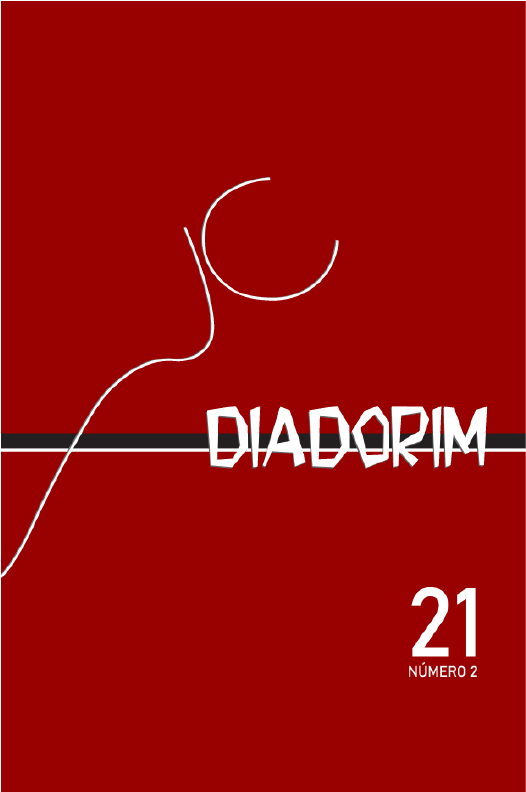STATIVE PREDICATES IN THE PROGRESSIVE IN BRAZILIAN PORTUGUESE
DOI:
https://doi.org/10.35520/diadorim.2019.v21n2a28398Schlagworte:
States, progressive, habitual predicates.Abstract
This paper aims to investigate in which contexts stative predicates are possible in the progressive in Brazilian Portuguese (BrP). In the literature, especially on English, this is unexpected, because progressive aspect is applied on events composed by stages (event predicates). States, however, are known as segmentally homogeneous, which means that: i) they have no stages and ii) they have the subinterval property of being true at minimal instants. In the present paper, we argue that the progressive aspect can be acceptable if a stage structure is grammatically licensed on the events denoted by the stative predicate. Moreover, we also found some similarities between the constraints on progressive statives in BrP and progressive habituals in English. Then we propose that the difference in the acceptability between stative predicates in the progressive in BrP (estar amando) and in English (is loving) comes from grammatical constraints on the composition of a stage structure between these languages, rather than semantic distinctions in the progressive.
Literaturhinweise
BERTUCCI, R. Uma análise semântica para verbos aspectuais em português brasileiro [A semantic analysis on aspectual verbs in Brazilian Portuguese]. São Paulo: Universidade de São Paulo, 2011. Tese. (Doutorado em Semiótica e Linguística Geral). Programa de Pós-Graduação em Linguística. Departamento de Linguística, USP, 2011.
BERTUCCI, R.; LUNGUINHO, M. V.; PARAGUASSU, N. Bare plurals and achievements verbs: a case study of aspectual verbs. Journal of Portuguese Linguistics. v. 9, n. 1, p. 117-137, 2010.
DOWTY, D. Word Meaning and Montague Grammar. Dordrecht: Kluwer, 1979.
LANDMAN, F. The progressive. Natural Language Semantics n. 1, p. 1-32, 1992.
LANDMAN, F. 1066: differences between tense-perspective-aspect systems of English and Dutch’ In: ROTHSTEIN, S. (ed.). Theoretical and Crosslinguistic Approaches to the Semantics of Aspect. Amsterdam/Philadelphia: John Benjamins, 2008, p. 107-166.
LANDMAN, F.; ROTHSTEIN, S. Incremental homogeneity in the semantics of aspectual for-phrases. In: RAPPAPORT HOVAV, M; DORON, E.; SICHEL, I. (eds.), Syntax, Lexical Semantics and Event Structure. Amsterdam: Benjamins, 2010, p. 229-251.
LANDMAN, F.; ROTHSTEIN, S. The felicity of aspectual for-phrases – part 1: homogeneity. Language and Linguistics Compass n. 6, v. 2, p. 85-96, 2012a.
LANDMAN, F.; ROTHSTEIN, S. The felicity of aspectual for-phrases – part 2: incremental homogeneity. Language and Linguistics Compass n. 6, v. 2, p. 97-112, 2012b.
PARTEE, B. John is easy to please. In ZAMPOLLI, A. (ed.). Linguistic Structures Processing. Amsterdam: North-Holland, 1977, p. 281-312.
QUINE, W. V. O. Word and Object, The MIT Press, Cambridge, MA, 1960.
ROTHSTEIN, S. Fine-grained structure in the eventuality domain: the semantics of predicative adjective phrases and be. Natural Language Semantics, n. 7, p. 347-420, 1999.
ROTHSTEIN, S. Structuring events. Oxford: Blackwell, 2004.
SMITH, C. The Parameter of Aspect. Kluwer Academic Press, 1991.
SCHMITT, C. Semi-copulas – event and aspectual composition. In: KEMPCHINSKY, P.;
SLABAKOVA, R. (eds.). Aspectual Inquiries. Springer, 2005, p.121-145.
TAYLOR, B. Tense and Continuity. Linguistics and Philosophy, n. 1, v. 2, p. 199-200, 1977.
VENDLER, Z. Verbs and times. Philosophical Review, n. 56, p. 143-160, 1957.
VENDLER, Z. Linguistics in Philosophy. Ithaca: Cornell University Press, 1967.
ZAGONA, K. Ser and estar: phrase structure and aspect. In: NISHIDA, C.; RUSSI, C. (eds.), Selected Proceedings of Chronos 8. Cahiers Chronos, Amsterdam: Rodopi, p. 303-327, 2010.
ZUCCHI, S. Aspect shift. In: ROTHSTEIN, S. Events and Grammar. Dordrecht: Kluwer, 1998, p. 349-370.
Downloads
Veröffentlicht
Ausgabe
Rubrik
Lizenz
Transferência de direitos autorais - Autorização para publicação
Caso o artigo submetido seja aprovado para publicação, já fica acordado que o autor autoriza a UFRJ a reproduzi-lo e publicá-lo na Diadorim: Revista de Estudos Linguísticos e Literários, entendendo-se os termos "reprodução" e "publicação" conforme definição respectivamente dos incisos VI e I do artigo 5° da Lei 9610/98. O artigo poderá ser acessado pela internet, a título gratuito, para consulta e reprodução de exemplar do artigo para uso próprio de quem a consulta. Essa autorização de publicação não tem limitação de tempo, ficando a UFRJ responsável pela manutenção da identificação do autor do artigo.

A Revista Diadorim utiliza uma Licença Creative Commons Atribuição-NãoComercial 4.0 Internacional (CC BY-NC 4.0).

